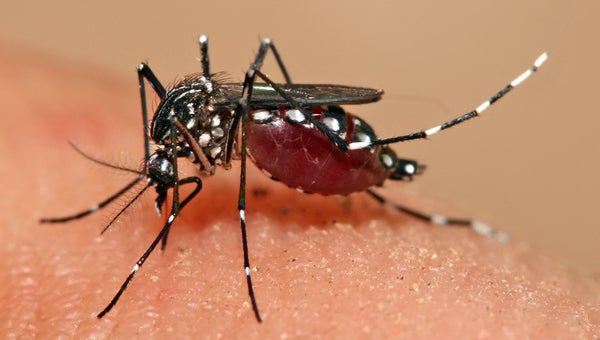ADPH confirms Zika virus case in Shelby County
Published 2:04 pm Wednesday, March 16, 2016

The ADPH confirmed a travel-related case of Zika virus in Shelby County. The virus is primarily transmitted through the bites of the Aedes mosquito. (Contributed)
FROM STAFF REPORTS
The Alabama Department of Public Health reported the second and third confirmed travel-related cases of Zika virus in Alabama residents. The positive specimens were from residents of Jefferson and Shelby counties.
The ADPH did not specify where in Shelby County the case was reported.
On Feb. 10, it was announced that a resident of Morgan County with a history of travel to a Zika-affected area was confirmed to have the Zika virus.
Specimens are being submitted for testing on Alabama residents with a travel history to areas where Zika virus outbreaks are ongoing.
In addition to the three positives, there have been 40 other submissions received with 28 test results pending as of March 15. As of March 9, there have been no locally acquired vector-borne cases reported in the U.S. All 193 cases nationally have been associated with travel to Zika-affected areas.
“We continue to work with the medical community to identify high-risk individuals,” Acting State Health Officer Dr. Tom Miller said. “We also caution travelers to be aware of the threat of mosquito-borne illnesses and to take appropriate bite protection measures.”
Zika virus is transmitted primarily through the bites of Aedes species mosquitoes. These mosquitoes are the same species that transmit dengue and chikunguya viruses which have also been associated with travel-related illness over the past few years.
There have been recent reports that Zika virus may also be spread through blood transfusion and sexual contact. Rarely, the virus may spread from mother to infant around the time of birth. It may also be possible to spread the virus from a mother to her baby during pregnancy.
Infection with the Zika virus causes only mild symptoms in the majority of cases, but an apparent link to birth defects and other pregnancy-related poor outcomes has been associated with the infection during pregnancy.
In response to concern about the Zika Virus, state agencies and other key stakeholders have been alerted.
“We are focusing on pregnant women and women in the reproductive age range who may become pregnant,” Miller said.
All pregnant women with a history of travel to an area with Zika virus transmission should be evaluated. Pregnant women reporting clinical illness consistent with Zika virus disease during or within two weeks of travel should be tested for Zika virus infection. In addition, asymptomatic pregnant women who have traveled to Zika-affected areas should be tested for the Zika virus between two to 12 weeks post travel.
The specific CDC recommendations include the following:
-Pregnant women should not travel to Zika-affected areas.
-Revised guidelines allow pregnant women to travel to places at higher elevations in outbreak regions. This is because the mosquitoes that spread the Zika virus are rare at higher elevations because the lack of humidity and other conditions.
-Men who have traveled to Zika-affected areas and have pregnant partners should abstain from sex or consistently and correctly use condoms for the duration of the pregnancy in all forms of sexual activity.
-Men who have traveled to Zika-affected areas and have non-pregnant partners should consider abstaining from sexual activity or consistently and correctly use condoms.
The Aedes mosquitoes are very aggressive biters and active during the day. They can also bite at night. ADPH advises the public to be aware of the risks posed by the Zika virus and to take steps to protect themselves from mosquito bites, including the following:
-Wear long-sleeved shirts and long pants.
-Use EPA-registered insect repellents containing DEET, picaridin, oil of lemon eucalyptus or IR3535 as directed.
-Stay and sleep in screened-in or air-conditioned rooms.
To help the public keep track of the status of Zika within the state, ADPH provides regular updates each Monday that include total numbers of test samples submitted, the number with results pending, and number of positive results for Alabama residents at Adph.org, search Zika.
Results are currently being returned in about four to six weeks. ADPH will update guidance as additional recommendations are developed. Since the outbreak is ongoing, the public is asked to check for updated travel notices at the CDC website, Cdc.gov, search Zika.









